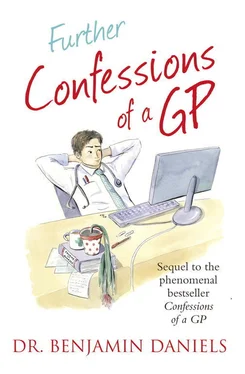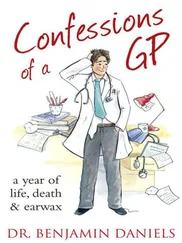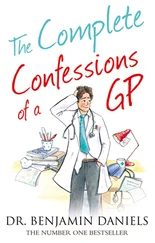‘You sure you don’t want me to say you’ve got flat feet or asthma or something? There must be something else you can do other than go into the army?’
‘No thanks, sir, I’ll be all right.’
I asked Lee to sign the form and with great concentration he wrote his name in a mixture of capital and small letters. His writing was that of a six-year-old and I could see why he didn’t feel able to go on to college.
Some doctors refuse to refer patients for abortions due to religious and moral objections. I could probably do the same for army medicals, but it would be a pointless gesture that would only put extra work onto the other doctors at the practice.
As I stamped the form, Lee beamed me a big smile.
‘You look really happy, Lee. You must be looking forward to joining up.’
‘What, oh yeah, I definitely am, Doctor, but mostly I’m just pleased you didn’t have to stick your finger up my arse.’
Tracey was in, yet again. I was also still receiving letters stating that she and her family were attending the emergency department too frequently, but I’d long since given up on trying to persuade Tracey not to visit so often. The latest hospital attendance was for ‘tummy aches’ in six-year-old Bradley and it was for that same reason that Tracey had brought him in to see me today.
‘They said up in A&E that they didn’t know what was wrong with him and to visit you instead,’ Tracey said.
Bradley was sitting sullenly in the chair rather than tearing around the room, which was out of character.
Once upon a time I had wanted to be a paediatrician and had spent a fair bit of time working on the children’s ward as a junior doctor. I could usually fathom out the cause of tummy pain in kids and I was confident that Bradley’s case would be no exception. I asked Bradley and his mum all about his symptoms. I asked about diarrhoea or constipation and if it hurt when he went for a wee. I asked if he was vomiting or had a fever and I made sure his glands weren’t up. I spent some time prodding his tummy, but it didn’t feel out of the ordinary, and when I tested his urine it was completely normal.
The next step was to ask about school. ‘Are any of the other children nasty to you at school?’ I asked. ‘Are you being bullied?’ Bradley shook his head.
‘He’s got loads of mates at school, Dr Daniels,’ Tracey butted in. ‘He loves school, but the teacher says he’s sitting out of games more and gets tired more easily.’ Bradley nodded gloomily in agreement at this. I got Bradley to get on the scales and when I plotted his weight on his growth chart it was dropping off a bit. Weight loss in children is a real worry and I urgently organised some more tests.
Within a couple of weeks Bradley had been for blood tests, X-rays and an ultrasound scan. Everything came back completely normal. I was relieved that Bradley didn’t have leukaemia, which had been my initial fear, but he was still having tummy aches and wasn’t himself. Most six-year-olds will complain of tummy aches at some point or another, but usually it doesn’t last once they are distracted by something fun. I asked Tracey to bring in Bradley to get weighed regularly by our nurse and it was this that led to a breakthrough.
‘He’s hungry,’ our practice nurse said to me triumphantly one morning after Bradley had been in.
‘Who’s hungry?’
‘Bradley, that boy you’ve been worried about. He’s having tummy aches because he’s hungry. That’s also why he’s stopped growing and losing weight and why he’s had no energy. It was obvious really. I asked Tracey about what he’s been eating and it turns out she’s been having problems with a debt collector and hasn’t been able to afford to buy food. She’s got herself in a right mess with it all and hasn’t told anyone.’
I had asked Bradley and his mum about every possible symptom and ordered a multitude of medical tests. But I hadn’t even considered asking if there was food in the house. Bradley wasn’t such a medical mystery after all. He was suffering from something unfortunately felt by millions of six-year-olds across the world. There was a famine in Tanzania when I was working out there and I saw hundreds of malnourished, hungry children. It just wasn’t something I was expecting to see in modern Britain. Our brilliant practice nurse Brenda had already put lots of things in place to help. The Citizens Advice team were working on resolving the debt issues and a charity was going to help with food donations until the family’s social worker helped sort out Tracey’s finances.
Bradley was an example of how easy it can be to give a medical diagnosis for what is actually a social problem. I wonder how many times I have labelled the misery of long-term poverty as clinical depression, and I once nearly diagnosed an old farm worker with eyesight problems, when the real reason he couldn’t read my chart was that he had never been taught to read. I see poverty on a daily basis, but never thought that I would see malnutrition in a six-year-old boy in Britain. We live in one of the richest countries in the world and food here is plentiful. I would like to think that Bradley was a one-off case, but as everyone is becoming increasingly squeezed financially, I fear that he may well not be.
My first experience of treating children was during my third year at medical school. It is at this time that we are allowed into the hospital to start seeing real-life patients. This is an exciting time for us as medical students, but there is always a fear that we will be asked difficult questions by a scary consultant on the ward round. This was the situation we found ourselves in as we started our first attachment to a paediatric department. Everyone had been very friendly up until now, but we had just started a ward round with Dr Bowskill. He was an odd man, most memorable for his 1970s side parting and very thick glasses with large brown frames. He looked more like an Open University physics lecturer than a doctor who needed to interact with small children and anxious parents.
My friend Jess and I were on his ward round and shuffled along behind him as he mumbled incoherently to the parents of the various children on the ward. We were mostly ignored until we reached the bed of a young boy with a rash.
‘Now medical students, this boy has a rash,’ he declared excitedly and then peered closely at the boy’s skin through his jam jar-sized lenses. ‘Fortunately for him this isn’t a meningitis rash, but what test might we use to see if it was?’
Dr Bowskill turned to Jess.
This is easy, I thought. Everyone has heard of the glass test. I was sure Jess would know how to hold a glass against the skin to see if the rash disappeared under pressure. Unfortunately, it was becoming apparent that she hadn’t ever heard of the glass test. Her expression was completely blank and she clearly didn’t have a clue how to answer Dr Bowskill’s question.
Rather than put Jess out of her misery or turn to me for the answer, Dr Bowskill just kept staring at her in silence. This silence just kept going and going and going, but Jess’s expression continued to remain completely blank. Come on Jess . I was trying to transmit the answer into her brain using telepathy, willing to try anything to end this excruciatingly awkward silence. If she’d just looked up at me I could have mouthed the answer but she just continued to stare vacantly at the small red spots on the boy’s arm.
After what seemed like an eternity, Dr Bowskill took off his glasses and handed them to Jess with great dramatic intent. ‘Perhaps these might help?’ he suggested in a loud, patronising voice.
Jess took the pair of glasses in her hand and I was sure she would click that she just had to hold the glass lens of his spectacles against the rash on the boy’s skin and end this whole tortuous affair. But Jess continued to look just as vacuous, holding those glasses in her hand. I could see her getting increasingly desperate.In a final moment of panic she put the spectacles on her nose and peered closely at the boy’s arm. She then looked up, shook her head and said, ‘Nope, still don’t know.’
Читать дальше
Конец ознакомительного отрывка
Купить книгу











![Benjamin Franklin - Memoirs of Benjamin Franklin; Written by Himself. [Vol. 2 of 2]](/books/747975/benjamin-franklin-memoirs-of-benjamin-franklin-wr-thumb.webp)
![Benjamin Franklin - Memoirs of Benjamin Franklin; Written by Himself. [Vol. 1 of 2]](/books/748053/benjamin-franklin-memoirs-of-benjamin-franklin-wr-thumb.webp)